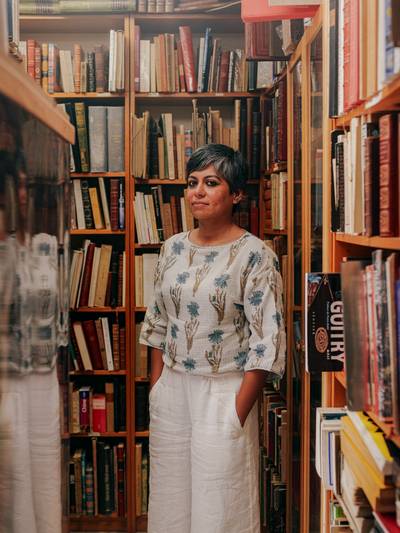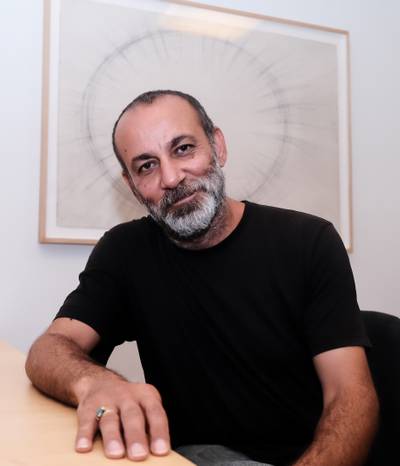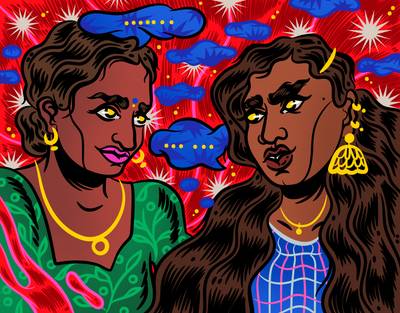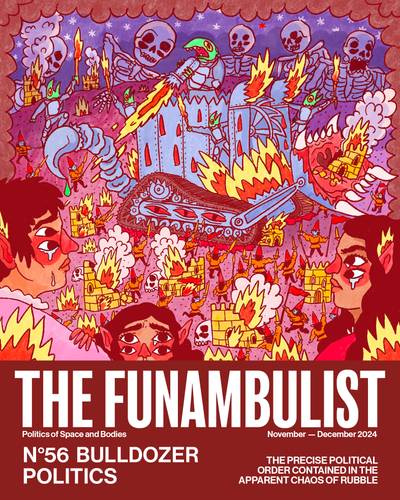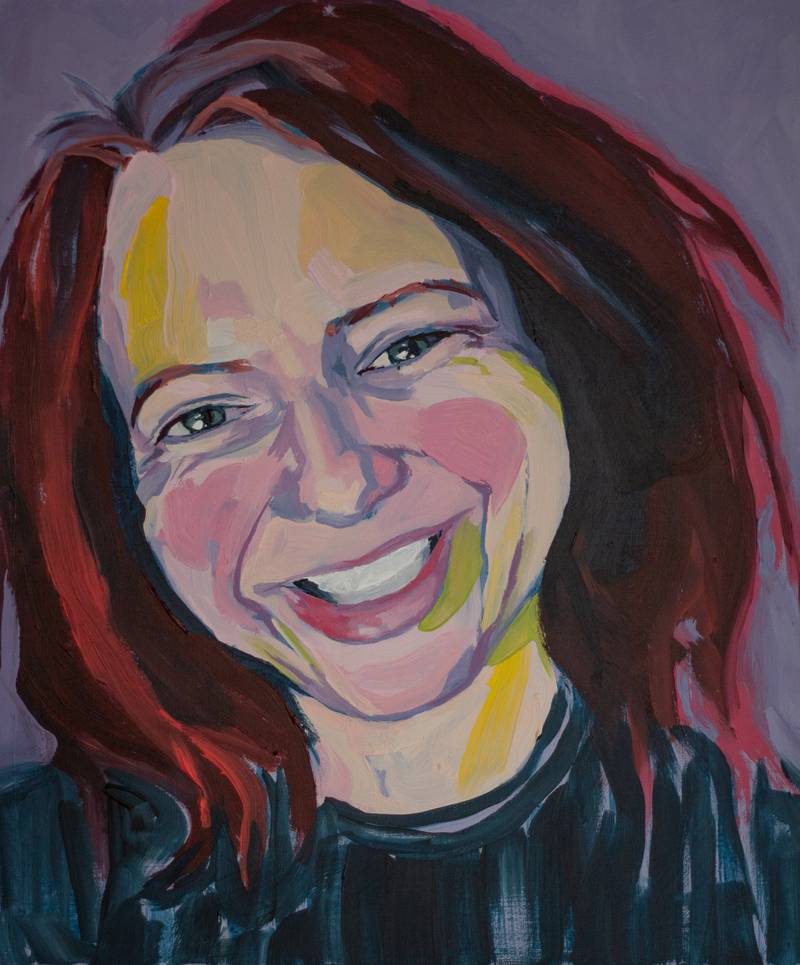

Portrait of Lisa Kalkowski by Emily Laakso
Elham Rahmati (b. 1989, Tehran) is a visual artist and curator based in Helsinki. She is the co-founder and co-editor of NO NIIN. In 2019 and 2020, she worked as the curator and producer of the Academy of Moving People & Images (AMPI), a film school in Helsinki for mobile people.
Vidha Saumya (b. 1984, Patna) is a Helsinki-based artist-poet. She is the co-founder and co-editor of NO NIIN – an online monthly magazine in Finland, and a founding member of the Museum of Impossible Forms – an award-winning cultural para-institution in Kontula, Finland.
Like a well-functioning infrastructure, producing is an invisible labour of care, resourcefulness, and passion for the project at hand. There’s a lot of work behind the scenes, and often the producer is the last to be acknowledged. Few people in the cultural sector are as industrious yet deeply affectionate as Lisa Kalkowski. Lisa is one of the few people whose interest in the projects she’s producing is as important as the project’s ethics. She has a penchant for learning languages, is a dance enthusiast, a problem solver, and a stress-diffuser. Lisa is also a cultural producer, theatre teacher, and diversity agent based in Helsinki. She has been a producer at the Baltic Circle Festival and is currently working as a producer for UrbanApa and Bioart Society. Many art and cultural workers, especially those based in Finland, have enjoyed Lisa’s assuring support for the practical and creative inputs in putting forward their work.
We spent a snowy spring afternoon discussing her work, tremendous energy, friendliness, and how these qualities flow seamlessly amidst her love for languages, people, pedagogy, and the desire to see a cultural field led by anti-racist and feminist methodologies. We met with Lisa Kalkowski in NO NIIN’s new office space at Tarkk’ampujankatu 18.
ELHAM: The first question I wanted to ask is, how much of yourself do you bring into the projects you work on, and what pressures do you find the most challenging?
LISA: I think I have brought a lot of myself to the projects I’ve worked with. When I work on a specific project or with a specific artist group, it’s about the group’s needs. What exactly is their project about? It’s also about understanding the different levels of needs to realise what they need from me. How can I help? Maybe as a personal skill, I have a sincere interest in people and working with them. I want to understand what I can offer or how I can help. I have worked as a teacher before, and I think it helps to have a little bit of a pedagogical approach with some projects in my job. For festivals or for clubs that I have produced, it’s good to be energetic and cheerful. It’s not necessary. But, I feel like it helped that I’m really into my projects – I’m very interested and invested. And, I was so fortunate that I never had to take on a job that I was not interested in, content-wise. All the projects I have been doing, everything I’ve been working on, and what I have been producing align with my ethical approaches, interests, and what I think the field needs. So that’s pretty great, and I’m really lucky.
E: You’re a naturally friendly person. Do you think it’s a must-have trait for producers?
No, I don’t think so. I think it’s great that we have very different personalities. I think “producer” can mean so many things. It depends on where you work, what is asked of you, and whether or not people would like to work with you. So maybe it’s more about thinking about what your strengths are. When I started working as a producer, I wasn’t aware that this was a job. I was always really good at organising things and bringing people together, and then suddenly I realised, “Oh, okay, you get paid for that.” I just genuinely stuck with what I’m good at, which turned out to be a job. Depending on your position, I think producers have so many other qualifications that can be important. My personality has happened to be a good fit for the places where I work.
E: Producers are usually the implementers of someone else’s concept. And as you say, you like choosing projects that you’re ideologically aligned with. Has it ever happened that you’re working on a project and you disagree with the methodology or something else in there that, for some reason, doesn’t sit well with you?
Well, that can happen because, as you say, as a producer, you’re not the one conceptualising the project—you don’t draw the framework.
I would never work on anything where I have an ethical conflict, for example, or where I feel like somebody is being poorly treated. At the same time, I try to work with friction and confrontation rather than avoid them. I’d like to make way for feedback, which you can do once you have implemented the proper structures for it. So, for example, if something doesn’t go well that I feel like I cannot do anything about, I would definitely take the feedback from the audience and go back to whoever is in charge of the framework. So I think it’s also about knowing how to navigate oneself to affect the implementation, even if you’re not involved in the project’s conceptualisation.
VIDHA: Are there any particular objectives you have in mind when approaching a project or beginning a project? Since you have worked on some projects for several years, how do you ensure that you stay interested in those projects?
Two interesting and difficult questions. My first objective is always to create a safe space for the people who work on the project and the audience. That’s the one big thing.
And how do I stay interested? Luckily, producers can change projects all the time. In the workplace where I’m now, we have a wide variety of things. Currently, I’m active at UrbanApa and the Finnish Bioart Society. Those are very, very different fields that I’m covering there. Bioart, for me, was completely new when I started working with them. And also, at UrbanApa, it’s great that we have workshops, platforms, and a discursive festival, so there are many different ways of working that I think it’s easy to stay interested because there are constantly new people and new formats. With the pandemic and moving everything online, I suddenly had to become a “Zoom-webinar-producer”, which was also really odd in the beginning. My objective is to stay interested, and I try to do that by constantly learning. I always want to learn something new, and if I feel like, okay, now I have learned everything that is to learn here, then I move on and look for new challenges.
E: Do you personally attend all the workshops?
Often, I am there automatically, which gives me an interesting perspective. I’m at many events, but never as an actual participant or audience role. That slightly changes my view of the events. Sometimes it’s a pity, as I would have loved to be more active as a participant in most of the projects I organised. Over time, I have tried to find ways to get this experience as a participant and see it more as a plus that I’m also the one behind the scenes.
As a starting point, I try to make people understand what they can expect from me. I think it’s a lot about listening in the beginning. So I try to understand what is needed because, in most cases, I think when you say “creative support,” it’s not always obvious. It’s more something that is happening on the meta-level. When I start working with someone, I always try to create a bond.
V: Producing artistic and cultural projects is a lot of our offering creative support. It’s not just about attending to the practicalities, but the producer also acts as a sounding board for the several creative individuals doing their work. You’ve been a part of projects for a long time, but others you’ve only recently begun working on, but the organization is older, and the ways of working are likely preset. So, what is the starting point when you are approaching a new project and thinking about offering this creative support,
As a starting point, I try to make people understand what they can expect from me. I think it’s a lot about listening in the beginning. So I try to understand what is needed because, in most cases, I think when you say “creative support,” it’s not always obvious. It’s more something that is happening on the meta-level. When I start working with someone, I always try to create a bond. Because I also think it is unclear what a producer does for many people, especially in an international context, people have very different ideas of what they can expect from a producer. Some come from art scenes with no producers, where the tasks I am handling are handled under a different job title. So I think it’s very much about making it clear. Okay, I am here, and I have these skills, and I’m happy to help you or help you find someone who can help you. It’s a lot about making yourself visible, maybe saying, "Hey, I’m approachable; this is what I’m here for; this is what I get paid for.” You also need to figure out all the information because when you work in the arts, there’s so much happening, like people already know someone or there’s already some pre-agreement. As a producer, I try to come in and understand where are we at? Where are we going? Who is this artist group? What is this project? What is the framework? What is already set in stone? What can still be modified? Is everybody happy with the current state? What is our goal here? What is the schedule? And then take it from there. Those are very practical approaches, and also, I’m a big fan of Excel. (laughs) So I would say my starting point is an Excel chart.
E: Let’s talk about expectations. I worked as a producer for the Academy of Moving People & Images for two years, and there I had to deal with a lot of people, and everyone would come at me with a lot of expectations and a lot of demands. I wasn’t exactly the director of the project, so I didn’t have 100% power to decide whether I could provide what I’d been asked, which would create friction and resentment. I’m wondering if you’ve had a similar experience? If yes, how do you draw boundaries between yourself and those who may come at you with demands and expectations beyond your power and responsibility to do anything about?
This is a very good question. I think for many producers, this is one reason why they switch jobs so often; it can be challenging to have this feeling of never living up to expectations. I always have this joke: as a producer, your job is to disappoint. (laughs) If everything goes perfectly well, nobody will say anything because that is expected. But if something goes wrong, they will turn to you. I’m not good at accepting that people are disappointed or something went wrong. So that’s something I have been very actively working on. I’ve realised that the more I can draw these boundaries, the better producer I will become. And it’s funny that you mentioned this because I thought to myself this year that, yes, my project this year is to work on these boundaries and think about how much time I have. How much energy can I give to each project? I think, especially in freelancing, it is super tough to stick to your schedule because people work too much and, in the end, get paid too little. So it’s really important that you also budget your time. That is something that I’ve learned from Sonya Lindfors, who taught me this: You have to budget your time. You have this task and get paid for 10 hours, so you do it in 10 hours and not in 12. Income is one thing, but mental health is also important. Do I still take calls at 10 in the evening, and am I approachable 24/7? Where do I draw the line? I think it’s a lot about creating self-discipline because you don’t have these times when nobody wants anything from you. People would love to contact you all the time (laughs).
E: How do you say no?
I think I never say no because I have worked a very long time in the service industry. I was a waitress, and I learned you don’t say No. You say, Please wait. I will get back to you on this. And then you run. (laughs)
It’s more about a pedagogical approach because it’s never, No, we don’t do this. No, I know I cannot help you with this. Most of the time, I try to offer an alternative, like this sounds good, but maybe we could facilitate it like this. So I try. It’s never a harsh “NO.” So it’s more about finding something that works for both of us.
If everything goes perfectly well, nobody will say anything because that is expected. But if something goes wrong, they will turn to you. I’m not good at accepting that people are disappointed or something went wrong. So that’s something I have been very actively working on. I’ve realised that the more I can draw these boundaries, the better producer I will become.
E: Have there been any conflicts you just couldn’t find a way out of?
No, I think I was really lucky. When I started working with Baltic Circle Festival, I was never by myself. At UrbanApa and Bioart Society, I always have people who back me up. This is also something really important to a producer, to have a supportive team to fall back on when there is a big issue, so you reassure yourself, I don’t have to deal with this alone. If anything comes up, I turn to the project director or whoever is in charge and say, okay, now I need help, and I have always gotten help.
E: It’s wonderful to have this support because a lot of times, the directors let you deal with the mess alone, which can be quite overwhelming. Do any organisations you have worked with have any conflict resolution mechanisms?
We always talked about things on a case-to-case basis if there was an issue. At UrbanApa, I work mainly with Sonya, so I speak with her if I have an issue. In Bioart Society, we are a really small team, so it’s clear who I can ask for help from if I need it. I don’t think I’ve worked anywhere where there was an official system for how to resolve conflicts. I always try first to see what it is in my power to do here before including more people because sometimes if you include more people in a conflict, it can get messier. I try to balance it.
E: Let’s say you work for an organisation with a diversity issue where all the staff are white. What would you do?
Well, most organisations in Finland have a diversity issue.
E: Do you think a producer can do anything about it? How much power does a producer have in pushing for change in equality-related issues?
I think a producer can do something about it. I was so lucky that I ended up at Urban Apa, and this is also why I want to acknowledge Sonya Lindfors for how much she taught me, how much I learned, and how grateful I am to have all these tools. I also recently graduated from the Globe Art Point and Culture for All’s diversity agent class. I want to stand for precisely this and say that: No, we can also do something as producers. You are very close to everything that is happening. And even if the orders from above are not perfect, you can still modify them a lot. You have to bring up these issues constantly. As a producer, you have a say in strategy meetings. Whenever you are there, you bring it up. I want to continue doing this by just constantly bringing it up. And I also think it’s a lot about voicing it more. We talk a lot about diversity issues in the Finnish art field. Now, we have to demand action.
E: Do you think the problem with the Finnish art organisations is that they are unaware or uneducated in that sense that they need us to teach them about diversity or are they simply unwilling to change anything?
I think people still don’t understand what privilege is. Many organisations have this approach that says, ‘Yeah, this is super important, but we would only be open to this if it could somehow affect us.’ But this also affects you, and you, and we all have to do this work. Diversity and inclusion are not projects. They are the very start of how you do work, and it’s so groundbreaking to start your work from there. And, of course, when we look at it, where do we even start from? The funding should change, and the legislation for these things should change. There will be so many possibilities to hold people accountable. We have to demand these changes. As a producer, you can do a lot if you keep pushing this agenda. Whenever I bring it up on different boards, people also listen. People are always saying, ‘Oh, yeah, we should do something.’ There are always these people that are like, ‘Ah, okay, do we have to do this?’ I believe that action is lacking in Finnish organisations—it’s difficult to generalise because it varies depending on which organisation we’re talking about—as in, people are okay with putting something on their website or saying, ‘Yes, we welcome people from different backgrounds,’ but where’s the action plan? And where’s the diversity on the boards? These institutions are like, ‘Yes, we’re for diversity,’ but then you have this old white male panel.
We need more confrontation and friction. In Finland, in general, and not getting too much into cliches, I feel people have difficulty dealing with friction and confrontation. And we need friction. This is so important that it is okay to call people out. It cannot be that some scandal happens, followed by some objections, and then there is no continuity in the discussion.
We need more confrontation and friction. In Finland, in general, and not getting too much into cliches, I feel people have difficulty dealing with friction and confrontation. And we need friction. This is so important that it is okay to call people out. It cannot be that some scandal happens, followed by some objections, and then there is no continuity in the discussion. Of course, there are institutions like Globe Art Point and Culture for All and so many activists that work hard on these issues. So many people try to push for change, but I sometimes wonder how visible it is on the larger scale of institutions because I feel that I am in this very active activist bubble. I’ve realised that many people don’t understand why this is so crucial, and this is shocking to me because I have worked in very different places and these ethical guidelines were very strong in them, which was a very important thing for me. Now, since I’ve taken university courses again, I see that there has been a change. At least something is changing, and people are trying to be more aware of this. But then many people are like, ‘Oh, okay, do we have to include this now also in the teaching?’
My utopia is to have this feminist and antiracist leadership team. I think this is also Sonya’s vision for UrbanApa and how we work at Stop Hatred Now.
E: On a lighter note, I’m curious to know what your future ambitions are.
I want to go into leadership. I am really happy about the tools I have collected, but I’m not ready yet; I’m still looking for some skills. I want to push for precisely what I said before, so I also have this idea. I don’t know how much I want to say in this interview [laughs]. We want to do this residency for cultural workers with a friend of mine: teach producers, educational staff, and all the people behind the scenes about anti-racist and feminist practices to broaden this understanding and connect those working on these issues. I think maybe we can change the field like that. Okay, we cannot change the grant-givers. We cannot change the directors, but if we just change the producers [laughs] and all the communication people, they can not do anything. If everybody is working with these ideas, it doesn’t matter anymore. [laughs]
E: That’s an excellent idea!
In Finland, the hierarchy is flat enough. It’s not so strict that you do exactly what is told to you, you have influence, and all the influence you have you should use.
V: I was curious; I’ve been saving this question. Do you have any hobbies?
[Everyone laughs]
Do you have any hobbies? I also like that you have this question last, like just before we end.
V: Because I feel like someone like you, and as we got to know you through this interview, you enjoy doing this work, and you’re working across three platforms, then you’re at the university, are you left with any time, or is this it?
No, it depends on how you define a hobby. I’m passionate about the work that I do, especially if I can contribute to changing the field in the way I hope. But yes, I do have hobbies [laughs]. I love languages, so I am learning languages. I love to dance; I’m learning to dance. As for my educational background, I am a theatre teacher. One of my hobbies is clowning and miming [laughs]. I teach laughter clubs [laughs], so many people-based things.
